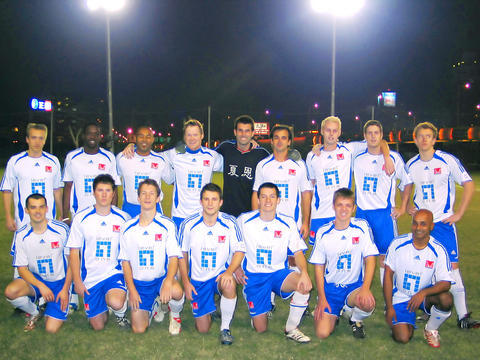Taipei City FC are on the verge of making a little bit of history as they prepare for a game which, should they win, could see them become the first expat team to claim the Businessmen's Soccer League (BML) title for 16 years.
The feat would be all the more remarkable as the side are in their first season, and their initial campaign started unpromisingly, as joint club captain Ross Conlon recalls.
"After our first four games we only had four points, but we haven't dropped a point since," says Conlon, a 26-year-old Irishman from Ennis, County Clare.

PHOTO COURTESY OF ROSS CONLON
The teething problems came from trying to get a new group of players to gel and from searching for the right playing formation.
"We started out with 4-4-2 but it was too defensive," says 31-year-old Englishman Dan Calvert, the other club captain. "Most of our players are good going forward, so we switched to 3-5-2."
Taipei City have their roots in long-standing expat side Taipei Animals, who both Conlon and Calvert played for.
"There were some differences of opinion -- over tactics, the way forward," Calvert recalls. "We decided to set up our own side but we still have good relations."
The Animals play in the Tavern Premier League (TPL), composed almost exclusively of expat teams, while City stayed in the BML, which, apart from City and one other side, is made up of all-Taiwanese teams.
"The standard of play in the BML is better overall than in the TPL," Conlon says. "There is a fair amount of overlap though, as most of our players also play for TPL sides."
"There are eight expat teams playing in the TPL, so the talent pool is diluted between the clubs, but many of the best players in the league play for us too," Calvert says.
Part of the reason for the split was a desire by Conlon and Calvert to be as competitive as possible and play at the highest standard they could.
"We aspire to be one of the best teams in Taiwan, not just the best expat team," Conlon says.
The BML is one level below the top tier of Taiwanese soccer but still includes clubs able to field former Taiwanese internationals and, indeed, proficient expat players like Calvert, once on the books of English professional side Peterborough United, and Conlon, who played for highly rated Irish junior side Avenue United.
The style of play is another thing that marks the leagues apart.
"Teams in the BML tend to keep the ball on the floor, they pass and move," Conlon says. "Expat teams tend to play more of a long-ball game and the TPL is probably slightly more physical."
The BML is a national league, although all matches are played in the Taipei area because of superior facilities and the fact that it's where most of its clubs are based.
Taipei City's final game of the season on Sunday week is a winner-take-all clash against league leaders Fritz FC. Fritz are firm favorites to win their penultimate game this weekend, which would leave them three points clear at the top of the table.
Should City beat Fritz the title could come down to goal difference. As things stand, City have the edge on this score so things couldn't be poised more tantalizingly.
Win, lose or draw, City have good cause to be pleased with the way things have gone in their first season. Even so, there is no chance of them resting on their laurels.
Although they lack Taiwanese players at present, it's a situation City hope to remedy. Probably the most encouraging avenue for progress is young players.
Calvert coaches local children and hopes that some will eventually strengthen City's ranks.
He is cautiously optimistic about the future of soccer in Taiwan, having been impressed by the standard of the kids he has worked with, but believes the game needs a higher profile before it can compete on a more equal footing with basketball and baseball.
City's final game of the season against Fritz FC takes place at Bai Lin Bridge in Shilin, Taipei, on March 23. Kick off is at 4pm.

SIBLING RIVALRY: Marc Marquez was locked in a duel with his little brother, falling behind at one point before recovering for his first season-opening victory since 2014 Six-time world champion Marc Marquez yesterday won the MotoGP season-opening Thailand Grand Prix to complete a dominant debut weekend at his new Ducati Lenovo Team, having also romped to Saturday’s sprint. The Spanish great took the 26-lap grand prix by 1.732 seconds for his 63rd MotoGP victory from younger brother Alex Marquez, who is still seeking a first checkered flag, with Francesco Bagnaia third to complete an all-Ducati podium. It completed a perfect weekend for Marc Marquez, who took pole position, the sprint victory and the grand prix win for a maximum 37 points to open the 22-leg 2025 campaign. He led from

AC Milan’s slender hopes of reaching next season’s UEFA Champions League took another hit on Thursday with a 2-1 defeat at Bologna which left them eight points from Serie A’s top four. Sergio Conceicao’s team sit eighth, some way behind fourth-placed Juventus after losing an entertaining contest at the Stadio Renato Dall’Ara, a match which was rescheduled from October last year due to torrential rain and flooding. Swathes of the Emilia-Romagna region in northern Italy, much of which is fertile agricultural land, had been left under water following a massive autumn downpour. Dan Ndoye prodded home the decisive goal in the 82nd minute

Former Australian motorcycle gang member-turned-golfer Ryan Peake, who served a lengthy jail term for assault, yesterday produced a “life-changing” maiden win to qualify for The Open Championship. Peake held his nerve for a one-stroke victory at the New Zealand Open, earning him a berth at the major in Portrush, Northern Ireland, in July, pending clearance to travel as a convicted criminal. The 31-year-old from Perth celebrated animatedly and was showered with champagne by friends on the 18th green of the Millbrook Resort course near Queenstown after a redemption story rarely seen in the refined sport of golf. Peake held back tears as he

MILWAUKEE PREVAIL: Giannis Antetokounmpo scored 28 points as the Bucks withstood Nikola Jokic’s 27th triple-double of the season to beat the Nuggets Golden State star Stephen Curry on Thursday drilled 12 three-pointers in a scintillating 56-point display that carried the Warriors to a 121-115 victory over the Orlando Magic. Curry’s explosive performance helped the Warriors dig themselves out of a 17-point hole, with the point guard signaling the start of the fightback with a three-pointer from beyond the half-court line to end the first half that pulled the Warriors within 66-52 at the break. In the third quarter, he single-handedly outscored the Magic with 22 points to Orlando’s 21. The four-time NBA champion finished two three-pointers shy of former teammate Klay Thompson’s record for most